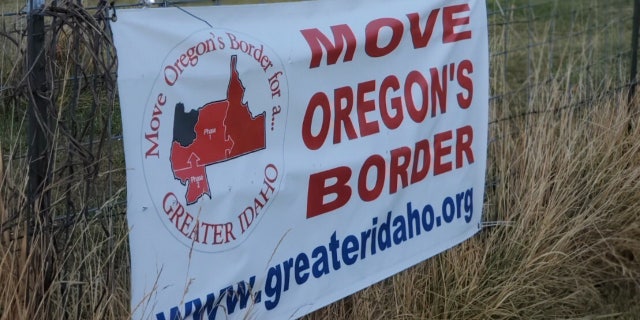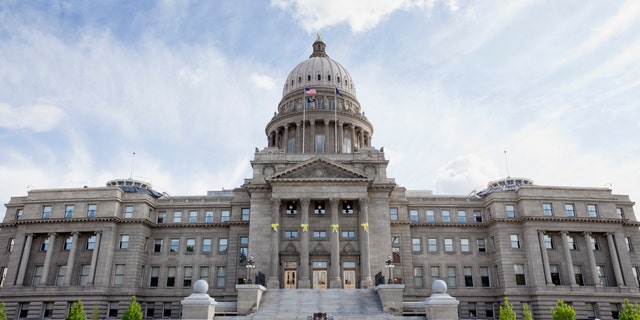A campaign to have rural eastern Oregon secede from the blue state and join more conservative Idaho has “virtually no chance” of becoming a reality, according to Idaho’s top state Senate Democrat.
“I’m very pleased this measure has virtually no chance of advancing into reality,” Idaho Senate Minority Leader Melissa Wintrow, D, told Fox News Digital. “It would be bad for all involved and bad for the country, and I am opposed to it at all levels.”
Wintrow was referring to a resolution making its way through the Idaho Legislature that wouldn’t move the Idaho-Oregon border but rather call for formal talks between the states’ legislatures about relocating the boundary line.
Last month, Idaho’s House of Representatives passed the bill, which will now be debated in the state Senate. It’s unclear if the bill will pass the Idaho Senate, but the chamber is, like the state’s House, dominated by Republicans.
The Greater Idaho movement seeks to make several counties in conservative eastern Oregon part of Idaho instead. (Illustration courtesy of Greater Idaho)
‘GREATER IDAHO’ MOVEMENT TO ABSORB CONSERVATIVE RURAL COUNTIES FROM LIBERAL OREGON GAINS MOMENTUM
Backers of the resolution support the so-called Greater Idaho movement, which seeks to incorporate about 13 Oregon counties, or 63% of the state’s landmass and 9% of its population, within Idaho’s borders.
Proponents of the idea argue it’s about maintaining more traditional values, preserving a certain way of life, and being properly represented by the state’s lawmakers.
“Yes, I am supportive of the Greater Idaho idea,” Idaho Rep. Judy Boyle, R, told Fox News Digital. “I have lived along the Oregon border my entire life, so have many east Oregon friends. They have been quite frustrated with the liberal I-5 western Oregon corridor running their state and completely ignoring their values and needs. They have finally come down to asking the voters, county by county, if they want to join Idaho. Currently, 11 counties have said YES [sic]!”
Proponents of Greater Idaho note that 11 counties in eastern Oregon have voted for ballot measures to explore the move and that, according to some polling, Idahoans would welcome expanding the state boundary. In Oregon, meanwhile, polling has shown a roughly equal number of voters support and oppose the idea, with about one-fifth of the population undecided.

A rural sign advertises the Greater Idaho movement. (Greater Idaho)
OREGON LAWMAKERS CONSIDER CUTTING MILLIONS FROM ADDICTION SERVICES AFTER DECRIMINALIZING DRUGS
Boyle argued the plan would be a win not only for eastern Oregon but also for Idaho.
“Advantages for Idaho are gaining citizens with likeminded conservative values, gaining another congressional seat, moving the Oregon ‘legal’ hard drugs several hundred miles away from Idaho’s population center, allowing these new Idaho citizens to remain in their existing homes and generational old ranches which relieves the pressure on the Idaho housing market, and brings more businesses, jobs, and innovators into Idaho,” she said.
However, some of Boyle’s colleagues counter that Idaho lawmakers should be focusing on the residents of their own state.
“I oppose wasting a single minute of our very short time in the Idaho Legislature working to solve the problems of a minority of Oregon’s population instead of focusing our energy on the very real problems that we need to solve in Idaho,” Rep. Ned Burns, D, told Fox News Digital. “The proposal to move state boundaries is virtually impossible to execute. In each state it would take a concurrent resolution passed by two-thirds of each body, then a vote of the citizens, then an amendment to the state constitutions, and finally an act of Congress signed by the president. The idea that this would happen is laughable.”
Moving the Idaho-Oregon border would require the approval of both state legislatures as well as the U.S. Congress.

Idaho State Capitol Building in Boise, Idaho. (powerofforever via Getty Images)
IDAHO JOINS TEXAS LAWSUIT AGAINST BIDEN’S WATERWAY PROTECTIONS RULE
Burns added that the U.S. political system works best “when there’s a balance of different viewpoints,” arguing that efforts “to build a one-party state lead to extremism and that can be very dangerous.”
But now the measure is through the House and in the hands of the Senate. While the Senate vote may not fall entirely along party lines, don’t expect the support of Wintrow, who echoed some of Burns’ concerns.
“While there are vast political differences in our region, Greater Idaho is not the proper remedy for those differences,” said Wintrow. “Our democratic republic depends on level heads coming together to find solutions to the issues that impact our citizens. Dividing state borders to create enclaves of politically like-minded people is the opposite of a healthy America.”
Despite such criticism, proponents of the Greater Idaho movement believe they’ve gained momentum. Matt McCaw, a spokesperson for the Greater Idaho group, has said he’s confident the measure under consideration will pass the legislature.

A homeless person sleeps in the sun during a heatwave in Portland, Ore., on June 28, 2021. (Maranie Staab/Bloomberg via Getty Images)
OREGON BILL WOULD PAY HOMELESS PEOPLE $1,000 A MONTH
Meanwhile, former Oregon House Speaker Mark Simmons recently penned an op-ed in the Idaho Statesman, a daily newspaper, to explain why he supports a Greater Idaho, saying if they’re successful they’ll be “freeing rural, conservative communities from progressive blue-state law.”
Beyond values, supporters also point to a recent analysis by the Claremont Institute that found the state-line shift could benefit Idaho economically, providing an annual net benefit to Idaho’s state government budget of $170 million.
However, critics have argued Oregon’s sparsely populated areas have high rates of Medicaid enrollment and could be an added expense to Idaho taxpayers.
A “Greater Idaho” would be as big as Montana and twice as populous, with the new land increasing the state’s population by about 21%.
CLICK HERE TO GET THE FOX NEWS APP
“Will it ever happen?” asked Boyle. “We won’t know unless we give it a try. Our Idaho Legislative Memorial is simply saying to Oregon that we are willing to talk about the possibility and what that would look like.”